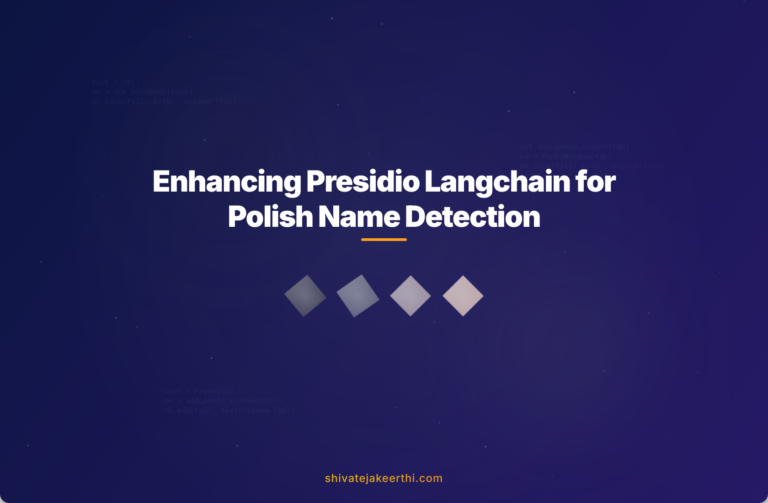When dealing with text anonymization, it’s common for widely used libraries like Presidio Langchain Experimental to miss certain nuances—especially when working with languages that don’t have strong built-in NLP support. One such issue many developers encounter is Presidio’s difficulty in accurately detecting Polish proper names. You’d typically expect that your anonymization tool will recognize and mask names like “Jan Kowalski” or “Anna Nowak,” but in practice, it’s not always the case.
Recently, users began raising concerns about Presidio Langchain Experimental failing to recognize Polish names, despite following the provided code snippets and official documentation. Let’s unpack this issue together, explore potential causes, and most importantly, find practical solutions to fix it.
How is Presidio Supposed to Work?
Presidio Langchain Experimental leverages natural language processing models like spaCy under its hood. Essentially, it scans through text, identifies sensitive entities like names, dates, or addresses, and replaces them with anonymized placeholders. It also supports reversible anonymization, meaning you can substitute real names temporarily and revert them later if you need to.
Here’s a sample code snippet provided by Presidio for reversible anonymizing:
from presidio_anonymizer import PresidioReversibleAnonymizer
from presidio_analyzer import AnalyzerEngine
text = "Jan Kowalski mieszka w Krakowie."
analyzer = AnalyzerEngine()
anonymizer = PresidioReversibleAnonymizer()
results = analyzer.analyze(text=text, language='pl')
anonymized_text = anonymizer.anonymize(text=text, analyzer_results=results)
print(anonymized_text)
You’d typically expect this code to successfully detect Polish names, producing an anonymized output like:
"<PERSON> mieszka w Krakowie."However, users often report getting unexpected outputs where the anonymizer fails to detect the name properly, sometimes leaving the name entirely visible or only partially anonymizing it. If you’re experiencing similar anomalies, you’re not alone.
Why Isn’t Presidio Detecting Polish Names?
The first point to investigate is the configuration settings being used. Presidio Langchain Experimental leverages external NLP models—primarily from spaCy—and often requires specific language model installations.
For detecting Polish names, the usual recommendation is using spaCy’s Polish pipeline model, pl_core_news_lg. If your Presidio setup doesn’t explicitly configure or activate this model, the tool reverts to less capable default behavior, relying mostly on pattern recognition rather than contextual entity recognition. Consequently, the anonymization process may not recognize Polish names effectively.
Another core issue lies in the inherent capability of Presidio itself. Despite the library’s impressive performance on common English datasets, its documentation suggests limitations for certain languages, including Polish. Thus, without custom configurations or additional plugins, recognition performance may suffer significantly.
Steps to Troubleshoot Polish Name Detection with Presidio
When Presidio doesn’t produce expected anonymization, here are useful steps you could take to troubleshoot the issue:
- Check spaCy Polish Model Installation: Ensure you have installed spaCy’s Polish large model (pl_core_news_lg) explicitly. This step is often overlooked and should be your first checkpoint:
python -m spacy download pl_core_news_lgThen, ensure your analyzer uses this Polish model explicitly by appropriate configuration.
- Verify Presidio Configuration: Inspect your current analyzer and anonymizer configurations. By default, Presidio might fall back onto generic or English-language models, causing issues in recognizing Polish names. Check out the Presidio documentation for customizing languages and recognizers.
- Test Simple Cases: Start with simple texts containing common Polish names to check analyzer performance. Then progressively move to complex sentences, helping isolate precisely where detection turns faulty.
- Experiment with Custom Recognizers: If out-of-the-box detection is insufficient, create custom recognizers for Polish names through regex patterns or predefined lists. Using Presidio’s ability to create custom recognizers could significantly improve accuracy.
Experimental Observations and Results
Interestingly, many experiments done using PresidioReversibleAnonymizer indicate inconsistent results when no explicit language model is specified. Presidio sometimes partially detects Polish entities or disregards them completely.
Deanonymization processes (the act of restoring original texts after anonymization) also become inconsistent because the anonymization itself is faulty. To achieve accurate reversal, the initial anonymization must accurately identify all replaced entities—a common pain point when Polish names aren’t recognized properly.
Improving Recognition of Polish Names
Given these constraints, here are practical recommendations for enhancing recognition accuracy in Polish entity detection:
- Add Custom Name Recognizers: Manually provide a list of common Polish surnames or use regex-like patterns to enhance Presidio’s sensitivity for Polish entities.
- Hybrid Approach with spaCy Customization: Consider customizing spaCy’s Polish model using additional training data. Follow spaCy’s training guidelines to enhance entity recognition accuracy.
- Combine Multiple NLP Tools: Combining Presidio with external NLP services specifically trained on Polish data, such as Stanza’s Polish model or open-source projects like CLARIN-pl, can drastically improve detection rates.
- Use Entity Recognition APIs and Integrate Separately: Leverage external APIs (e.g., Google’s Cloud NLP Service, IBM Watson NLP API) via API calls. After obtaining accurate entity detection externally, use Presidio only as an anonymization layer—simply importing the detected entities.
Alternatives and Complementary Tools to Explore
Let’s quickly review some powerful alternatives if you continue to face issues with Presidio:
- spaCy alone, enhanced with custom training.
- Hugging Face Transformers, particularly useful because you can utilize Polish-trained language models readily available.
- Stanza NLP Toolkit, offering excellent multilingual NER capabilities.
- Azure Cognitive Services for Text Analytics or Google’s Cloud NLP API if seeking enterprise-level integrations.
If you’re working mainly with Python, exploring additional resources from this Python resource page can further aid your understanding and integration processes.
When Presidio Langchain experimental fails you in detecting Polish names, remember you’re not locked in. Using these practical suggestions and combining best-of-breed tools, you’ll significantly reduce frustrations while achieving accurate anonymization results.
Correctly anonymizing textual information, especially names from less-supported languages like Polish, remains vital for compliance, privacy, and data protection. Ensuring meticulous attention to detail and integration with capable NLP models can make a world of difference in your project outcomes.
What’s your next step towards optimizing text anonymization for multilingual use cases? Consider more robust, customized approaches to improve accuracy—and remember, sharing your experiences helps the entire community benefit from collective knowledge.



0 Comments